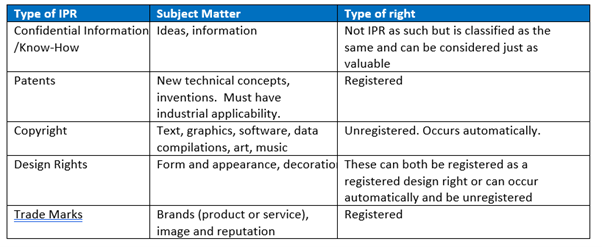Intellectual Property Rights
What are Intellectual Property Rights and why are they important?
.jpg)
IP is an (intangible) asset, just like a car or a building, and needs to be protected from unauthorised use.
To help protect the IP we generate, we use Intellectual Property Rights (IPR). These are the legal rights protecting the owners of IP and is a term used to describe the rights which protect your ideas and other forms of intellectual creation. The first owner of IP is normally either the person who invents, authors or designs the IP, or their employer (depending on the contractual arrangements governing their work). Commercial exploitation of the IP can occur directly by the owner of the IP, or by licensing the IP to be used by other companies.
It's important to the University because:
IP protection is critical to fostering innovation.
Without protection of IP, anyone can use and exploit the knowledge without the attendant development costs, in terms of both the physical and intellectual resources, thereby giving an unfair benefit to others.
IPR protects research, encourages innovation and rewards entrepreneurs.
Types of IPR
There are five main types of IPR:
A single project may generate more than one type of IPR and there may be more than one owner. While certain IPR can arise almost automatically, other types of IPR only arise through a formal registration procedure. A general outline of the types of IPR and to what they relate is as follows:

The following are examples of situations in which IPR can arise in academic work (table amended but original courtesy of Murgitroyd and Company) - this list is just an illustration; in reality multiple combinations can occur.
| Using others' research papers, publications | | X | X | | |
| Using others' inventions | X | X | X | X | X |
| Research information. Preparing and collating research or experimental results | | X
| X | | |
| Publishing or presenting research, academic or technical papers | X | X | X | X | |
| Industrial design projects | X | X | X | X | |
| Contract research | X | X | X | X | |
| Consultancy | X | X | X | X | X |
| CPD | | X | X | X | X |
| Starting discussions on a collaborative project or contract research | X | X | | | |
Receiving important confidential information
| | X
| | | |
Giving out confidential information
| X | X | | | |
| Using computer software | | X | X | | X |
| Developing computer software | X | X | X | | X |
| Revising or providing a manual or computer assisted drawings | | X | X | X | |
| Preparing notes for lectures | | X | X | | |
| Responding to telephone queries of a technical nature | | X | | | |

For additional information please visit UK IPO - Protect your IP.
.png) Are you not sure what type of IP you have? Please get in touch with the Business Engagement & Innovation Team who can help you. You can also check out the UKIPO’s training tool kit.
Are you not sure what type of IP you have? Please get in touch with the Business Engagement & Innovation Team who can help you. You can also check out the UKIPO’s training tool kit.





